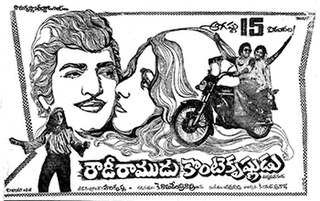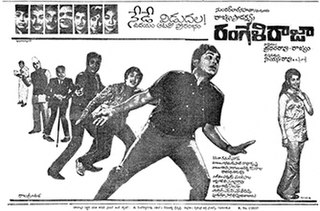
Ghantasala Venkateswararao, known mononymously by his surname as Ghantasala, was an Indian playback singer and film composer known for his works predominantly in Telugu and Kannada cinema and also in Tamil, Malayalam, Tulu and Hindi language films. He is considered one of the greatest singers of Telugu cinema. In 1970, he received the Padma Shri award, India's fourth highest civilian award for his contribution to Indian cinema. According to The Hindu and The Indian Express, Ghantasala was 'such a divine talent and with his songs he could move the hearts of the people'. 'Ghantasala's blending of classical improvisations to the art of light music combined with his virtuosity and sensitivity puts him a class apart, above all others in the field of playback singing'. Gifted with what Indian film historian V. A. K. Ranga Rao called 'the most majestic voice', Ghantasala helped Telugu film music develop its own distinct character which remains unparalleled. He is referred to as the 'Gaana Gandharva' for his mesmerising voice and musical skills.

Lava Kusa is a 1963 Indian Hindu mythological film directed by C. S. Rao and his father C. Pullayya. The film was scripted by Sadasivabrahmam, Samudrala Sr. along with C. S. Rao and C. Pullayya. The film was produced by Sankara Reddy under Lalita Sivajyothi Films. Lava Kusa is the first full-length colour film of Telugu cinema.
Chittajallu Srinivasa Rao was an Indian actor, writer and director. He was the son of film director Chittajallu Pullayya. He directed around 65 films in the Telugu, Tamil, Malayalam and Oriya languages. He garnered two National Film Awards for directing the films Lava Kusa (1963) and Desamante Manushuloyi (1970). Directors including Muktha V. Srinivasan and K. S. Sethu Madhavan worked as his assistants.

Bhale Ramudu is a 1956 Indian Telugu-language drama film, produced by V. L. Narasu and directed by Vedantam Raghavayya. The film stars Akkineni Nageswara Rao, Savitri and music composed by S. Rajeswara Rao. It is a remake of the Hindi film Kismet (1943). The film was simultaneously made as the Tamil movie Prema Pasam.
Shabash is a term used in the Indian subcontinent to signal commendation for an achievement, similar in meaning to bravo and kudos. It may refer to:

Rakta Sambandham is a 1962 Indian Telugu-language drama film directed by V. Madhusudhana Rao and produced by Sundarlal Nahata and Doondi. The film stars N. T. Rama Rao, Kanta Rao, Savitri and Devika, with Relangi, Ramana Reddy, M. Prabhakar Reddy and Suryakantham in supporting roles. A remake of A. Bhimsingh's Tamil-language film Pasamalar (1961), it narrates the story of bonding between Rajasekhar "Raju" and his sister Radha, who lose their parents at an early age. Radha falls in love with Raju's friend Anand and they marry. The rest of the film focuses on the impact made by Anand's aunt Kanthamma on their lives post marriage.

Janaki Ramudu is a 1988 Indian Telugu-language film directed by K. Raghavendra Rao and produced by K. Murari under Yuva Chitra Arts. The film stars Nagarjuna, Vijayashanti and Jeevitha, with music composed by K. V. Mahadevan. It was dubbed into Tamil as Idhaya Devathai. The film was influenced by Mooga Manasulu (1964).

Pandanti Kapuram is a 1972 Indian Telugu-language family drama film directed by Lakshmi Deepak. The film features an ensemble cast of Krishna, S. V. Ranga Rao, Vijaya Nirmala, Jamuna, B. Saroja Devi, Anjali Devi, Gummadi, Prabhakar Reddy. Released on July 21, 1972, Pandanti Kapuram was one of the biggest hits of the year. It is also the first film of Krishna to celebrate a silver jubilee run at the box-office.

Sardar Paparayudu is a 1980 Indian Telugu-language historical fiction film written and directed by Dasari Narayana Rao. Produced by Kranthi Kumar, it stars N. T. Rama Rao in the title role, alongside Sridevi and Sarada, with music composed by Chakravarthy. The film was a commercial success and was remade in Hindi as Sarfarosh (1985).

Santhi Nivasam is a 1960 Indian Telugu-language drama film directed by C. S. Rao. The film stars Akkineni Nageswara Rao, Rajasulochana, Kantha Rao, Krishna Kumari and Devika. It is an adaptation of Palagummi Padmaraju's Telugu play of the same name, which itself was based on B. S. Ramiah's Tamil play Malliyam Mangalam.

Ramu is a 1987 Indian Telugu-language drama film, produced by D. Ramanaidu under the Suresh Productions banner and directed by Y. Nageswara Rao. It stars Nandamuri Balakrishna and Rajani, with music composed by S. P. Balasubrahmanyam. It is a remake of the Tamil film Per Sollum Pillai.
Manassiddare Marga is a 1967 Indian Kannada-language film, directed by M. R. Vittal and produced by Srikanth Nahatha and Srikanth Patel. The film stars Rajkumar, Rajashankar, Narasimharaju and K. S. Ashwath. The film has musical score by M. Ranga Rao. The film was a remake of 1957 Hindi movie Bada Bhai which had also been remade earlier in Telugu in 1959 as Sabhash Ramudu. The picturization of the song Ee Jeevana Bevu Bella was the first instance of a Kannada movie using the back projection technology.

Rowdy Ramudu Konte Krishnudu is a 1980 Indian Telugu-language action film produced by N. T. Rama Rao under his Ramakrishna Cine Studios banner and directed by K. Raghavendra Rao. It stars N. T. Rama Rao, Nandamuri Balakrishna and Sridevi. The music composed by Chakravarthy.
Mamagaru is a 1991 Telugu-language drama film directed by Muthyala Subbaiah. It stars Dasari Narayana Rao, Vinod Kumar Alva, Aishwarya and Yamuna in the main roles. The film is a remake of the Tamil film Naan Pudicha Mappillai.

Ramudu Kadu Krishnudu is a 1983 Telugu-language drama film, produced by N. R. Anuradha Devi under the Lakshmi Films Combines banner, and directed by Dasari Narayana Rao. The film stars Akkineni Nageswara Rao, Jayasudha, Radhika and music composed by Chakravarthy. The film was recorded as a Super Hit at the box office.

Rangeli Raja is a 1971 Telugu-language, action-drama film, produced by C. Lakshmi Rajyam, C. Sridhar Rao, and Sundarlal Nehata under the Rajyam Productions banner. and directed by C. S. Rao It stars Akkineni Nageswara Rao, Kanchana and music has been composed by Ghantasala.

Sabhash Raja is a 1961 Indian Telugu-language drama film, produced by Sundarlal Nahatha, Doondy under the Rajasri Productions banner and directed by P. S. Ramakrishna Rao. It stars Akkineni Nageswara Rao and Rajasulochana, with music composed by Ghantasala.
Rayudugaru Nayudugaru is a 1996 Telugu-language action-drama film, produced and directed by Dasari Narayana Rao under the Dasari Film University banner. It stars Akkineni Nageswara Rao, Dasari Narayana Rao, Vinod Kumar Alva and Roja, with music composed by M. M. Keeravani.

Nirupedalu (transl. Destitute) is a 1954 Indian Telugu-language drama film, produced by Donepudi Krushna Murthy under the Gokul Pictures banner and directed by T. Prakash Rao. It stars Akkineni Nageswara Rao, Jamuna, with music composed by T. V. Raju.

Tiger Ramudu is a 1962 Indian Telugu-language action drama film, produced by Patnam Chinna Rao and Vaddi Sriramulu and directed by C. S. Rao. It stars N. T. Rama Rao, Rajasulochana with music composed by Ghantasala.














